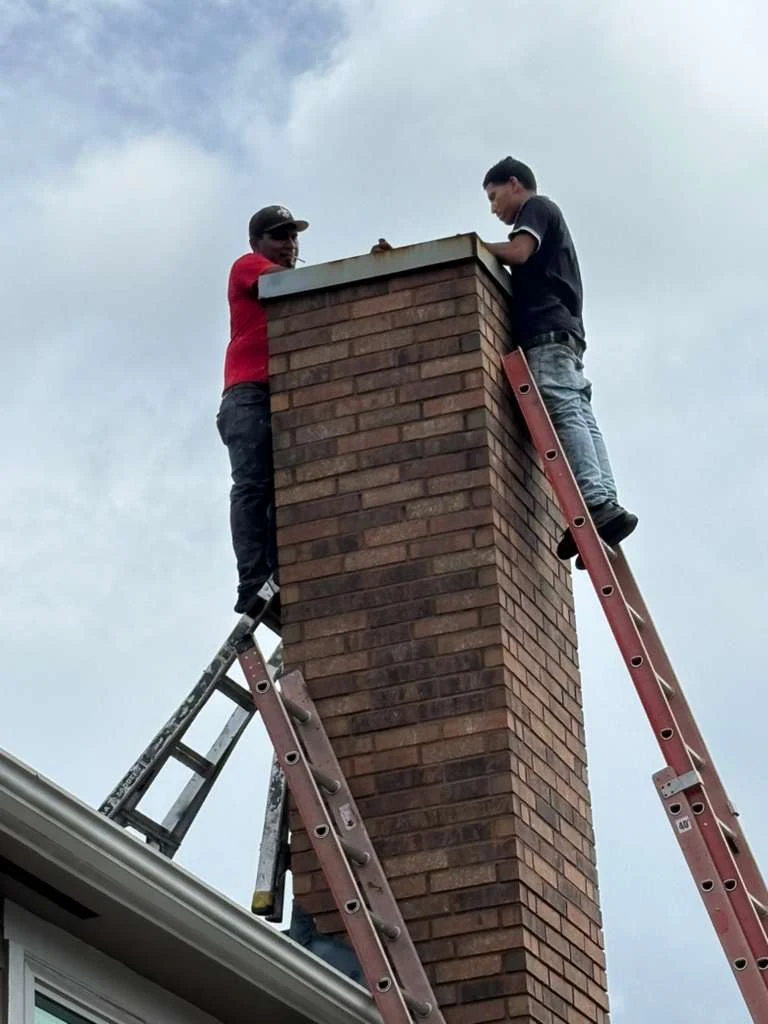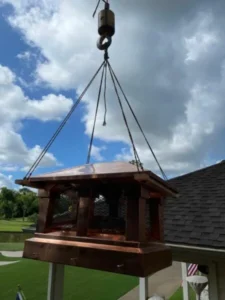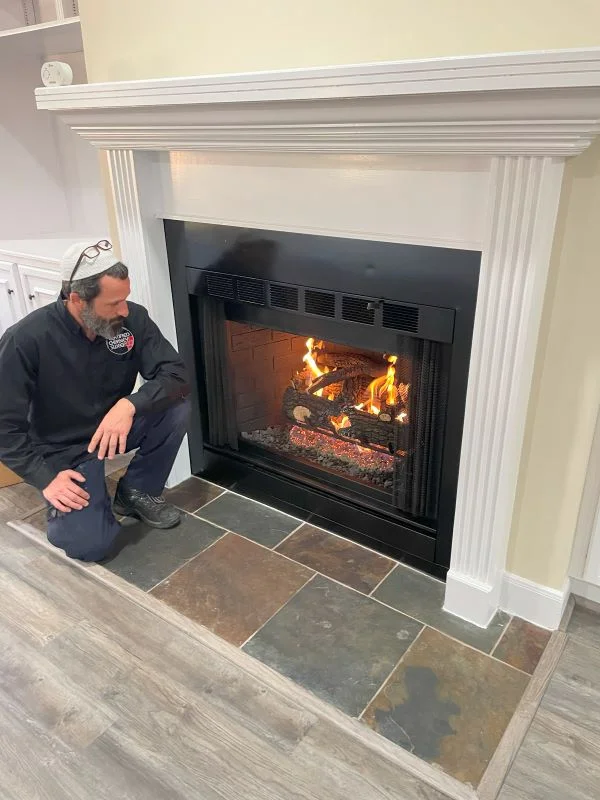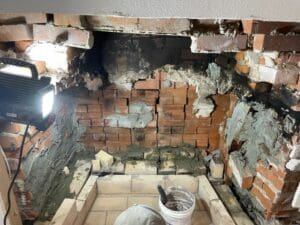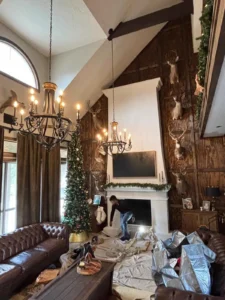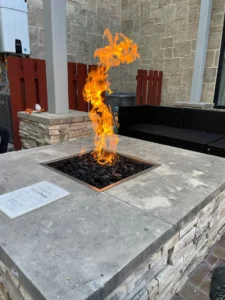Your chimney may not be something you think about every day, but it plays an important role in keeping your home safe. A chimney moves smoke, gases, and heat out of your house when you use your fireplace. If it’s damaged or not working properly, it can put your home and family at risk. For overall care and service options, see our full list of chimney services.
The problem is that many homeowners don’t notice chimney issues until they become big, expensive repairs. By learning the warning signs early, you can prevent costly damage and keep your chimney in top shape. If you are unsure where to start, schedule a professional chimney inspection.
Crumbling Bricks or Mortar 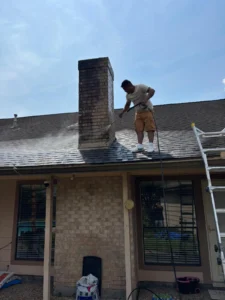
One of the most visible signs your chimney needs attention is crumbling bricks or mortar. Over time, weather wears down the materials holding your chimney together. Moisture, heat, and even small earthquakes can create cracks.
If you see pieces of brick on the ground or gaps between the mortar lines, your chimney is starting to weaken. This damage may look small, but it can quickly spread and compromise the entire structure. Calling a professional for chimney masonry repair as soon as you notice crumbling can save you from a full rebuild later. When damage is extensive, structural work may be needed, which falls under chimney construction.
Rust on Metal Components
Chimneys often have metal parts like dampers, flashing, and caps. If you see rust forming on these areas, it means moisture is getting into places it shouldn’t. Rust weakens the metal and can eventually cause leaks.
A rusty damper may stop sealing properly, which allows cold air and moisture into your home. Rusted flashing around the base of the chimney can let water seep into your roof. Addressing metal issues early with targeted chimney flashing repair helps protect both the chimney and the roof. If flashing is beyond repair, you may be looking at chimney flashing replacement.
White Stains on the Chimney Exterior
Have you noticed a white, chalky stain on the outside of your chimney? This is called efflorescence. It happens when water seeps into the brick and brings salt deposits to the surface. While the stain itself is not harmful, it’s a clear sign that moisture is damaging your chimney.
If left untreated, water damage can weaken bricks and mortar until major repairs are needed. Efflorescence is like a warning light telling you it’s time for maintenance and a check for leaky chimney issues.
Strong Odors Coming From the Fireplace
A healthy chimney should move smoke and smells outside your home. If you notice strong odors, especially during humid weather, it may be a sign of creosote buildup or moisture problems.
Creosote is a flammable material that builds up inside chimneys after burning wood. Not only does it smell bad, it also increases the risk of chimney fires. A musty odor can mean water is entering the flue, which leads to mold growth. Either way, strong odors mean your chimney needs immediate attention and likely a professional cleaning. Commercial properties should also consider routine commercial chimney cleaning.
Either way, strong odors mean your chimney needs immediate attention and likely a professional cleaning.
Smoke Backing Into the Home
When you light a fire, the smoke should rise and exit through the chimney. If smoke backs up into your living space, something is wrong. Common causes include a blocked flue, a damaged liner, or a closed damper.
This is dangerous because smoke can carry carbon monoxide. If your chimney is not venting properly, stop using your fireplace and call a professional right away. In many cases the solution involves inspection and, if needed, chimney relining.
Water Leaks or Stains Inside the Home
Water and chimneys don’t mix. If you notice water stains on your walls or ceiling near the chimney, moisture is getting inside. Leaks may come from damaged flashing, cracked crowns, or missing chimney caps.
In storm prone areas, water damage is one of the biggest threats to chimneys. Ignoring leaks leads to mold growth, rotting wood, and expensive structural repairs. Early fixes often include chimney cap repair or installation and sealing leaky areas.
A Damaged or Missing Chimney Cap
A chimney cap covers the top of your flue, keeping out rain, debris, and animals. If the cap is damaged or missing, your chimney is exposed. Birds, squirrels, and leaves can block airflow. Rainwater can pour in, leading to rust and water damage.
A missing cap may seem small, but it can cause thousands of dollars in damage over time. Solve it quickly with professional chimney cap repair and installation.
Excessive Creosote Buildup
If you shine a light into your chimney and see thick, black deposits, that’s creosote. This tar-like substance is highly flammable and is one of the leading causes of chimney fires.
Even if you don’t use your fireplace often, creosote can build up after just a few fires. Annual cleaning is the best way to remove it. When paired with an annual certified chimney inspection, you lower risk significantly.
Cracks in the Chimney Crown
The crown is the concrete top of your chimney that keeps water from entering. If it cracks, moisture can seep in and damage the flue and masonry. Cracks in the crown often start small but expand over time with heat and weather changes.
A damaged crown leaves the entire chimney vulnerable. Repairs are usually simple if caught early, but waiting too long may mean broader chimney replacement.
Animals or Debris in the Chimney
Sometimes the signs are obvious. If you hear scratching noises, see nesting material, or notice debris falling into your fireplace, your chimney is blocked. Animals and debris prevent smoke from venting properly and increase the risk of fires.
A sweep can safely remove blockages and fit a cap to prevent future problems. If you have persistent airflow issues, book a detailed evaluation such as a Level 2 chimney inspection.
The Cost of Ignoring These Warning Signs
Delaying chimney repairs can be very expensive. What starts as a small crack or minor rust can lead to major damage that costs thousands to fix. A rebuild or rework of components can include structural chimney repair or even new chimney installation in severe cases.
Even worse, ignoring chimney issues can put your family at risk of fires, carbon monoxide leaks, and structural damage to your home.
How to Stay Ahead of Problems
The best way to avoid costly repairs is with regular maintenance. Schedule yearly checks like a Level 1 chimney inspection, clean your system to remove creosote, and check for moisture damage after storms. Simple tasks like keeping your cap in place and clearing debris can prevent bigger issues..
Think of chimney care as protecting an investment. Just like a roof or foundation, your chimney is part of your home’s structure. Taking care of it ensures comfort, safety, and peace of mind..
Conclusion: Act Fast to Save Money and Stay Safe
Your chimney may not always be top of mind, but paying attention to early warning signs can save you from expensive repairs. Crumbling bricks, rust, odors, smoke, and leaks are all signals that your chimney needs immediate care.
For homeowners, the message is simple. Do not wait. Schedule inspections, invest in professional cleanings, and repair small issues before they become big problems. If you are considering efficiency or aesthetic upgrades, options like fireplace inserts, electric fireplaces, or gas log sets can also reduce maintenance and improve performance
Avoid a Fire Hazard: Get Your Chimney Inspected Today
Don’t wait for a small chimney problem to turn into a costly—or even dangerous—issue. In Texas, a variety of factors, from fluctuating weather to animal nests, can compromise your chimney’s safety and function.
Look for these warning signs that your chimney needs immediate attention:
- Smoke Backing Up: If smoke is entering your home, you could have a blockage from creosote buildup or debris, which is a serious fire hazard.
- Cracked Masonry or Crown: Cracks in the chimney crown (the top part) or the masonry itself can allow water to seep in, leading to structural damage and costly repairs.
- Water Stains or Rust: Water damage is one of the most common issues in Houston chimneys. Look for rust on the damper or firebox, or white stains (efflorescence) on the exterior bricks.
- Strange Odors: Lingering, smoky smells or damp, musty odors can signal a buildup of creosote or a problem with water intrusion.
At Texas Chimney LLC, we specialize in thorough evaluations and repairs. Start with a professional certified chimney inspection. If buildup is the issue, book cleaning and safety checks through our commercial chimney cleaning page for businesses or use our main chimney services hub for homeowners. For home fire safety beyond the fireplace, remember to keep vents clear with routine dryer vent cleaning.
Don’t put your home and family at risk. Call us today for a professional inspection and repair quote!

